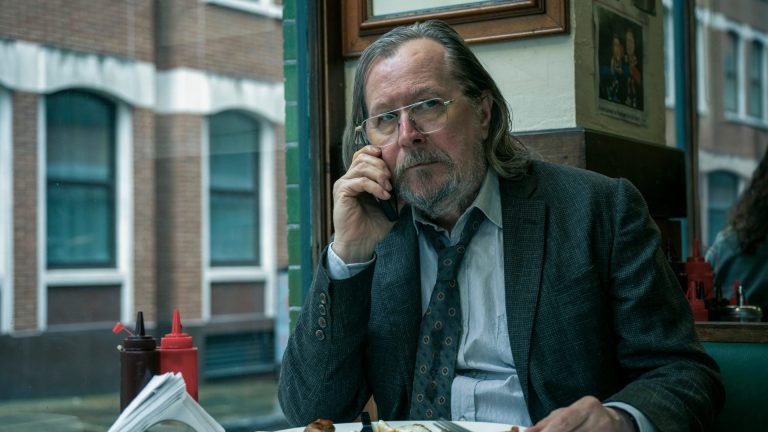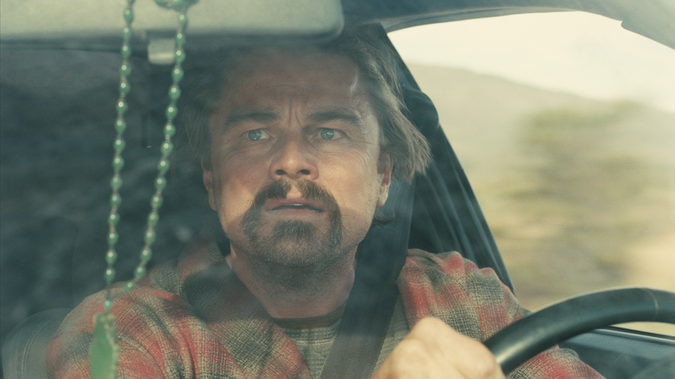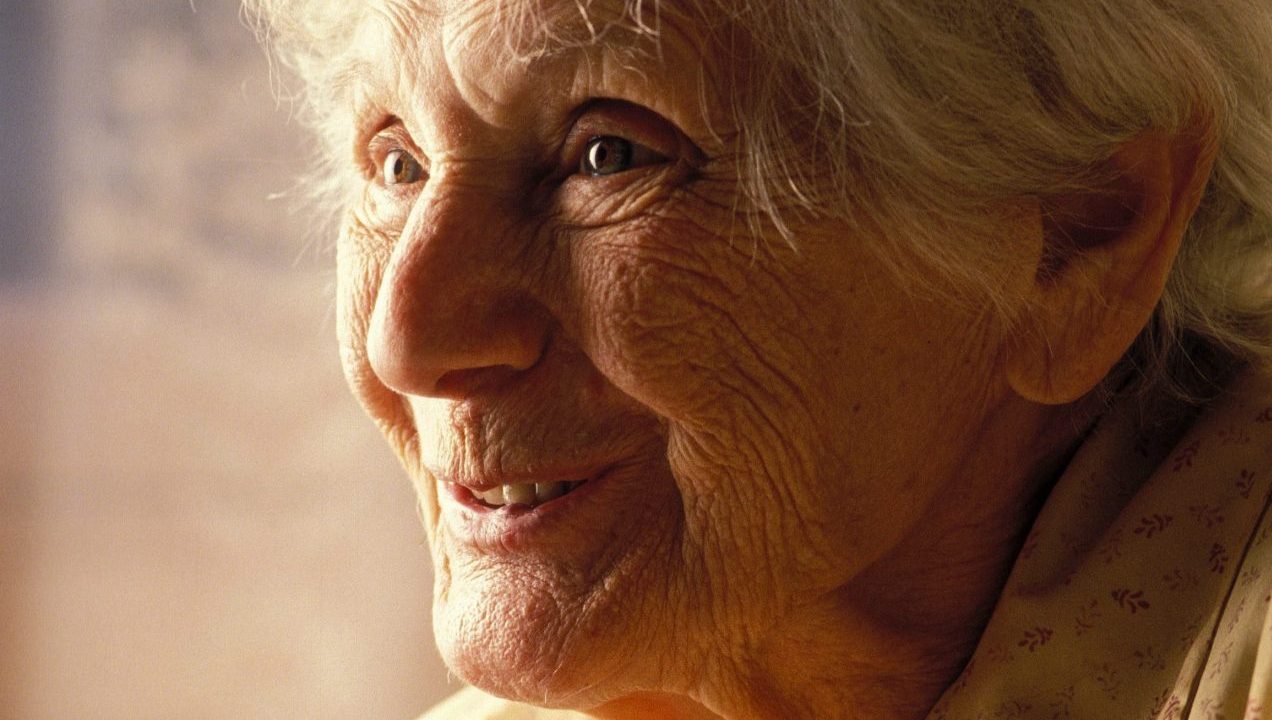PICK OF THE WEEK
One Battle After Another (general release)
On March 15, at the Dolby Theatre in Los Angeles, Paul Thomas Anderson’s 10th feature film ought to be awarded the Oscar for Best Picture. Yes, it is that good.
For the second time – following Inherent Vice (2014) – Anderson has quarried the work of Thomas Pynchon: in this case, the great postmodernist’s political novel Vineland (1990), set in the year of Ronald Reagan’s re-election to the presidency. On this occasion, however, the connection between book and movie is loose.
Roaming freely over the American timescape, One Battle After Another opens with a thrilling action sequence in which a militant group, the French 75, liberates the detainees in a military facility near the Mexican border. The voice of the revolution is Perfidia Beverly Hills (Teyana Taylor, excellent), who declares: “Free borders! Free choices! Free from fear!”
The contemporary resonance is vivid and the French 75 has naturally been compared to Antifa (the decentralised anti-fascist network in the US today). But in style, rhetoric and method, the group more closely resemble the radical organisations of the late 1960s and early 1970s: the Weather Underground, the Black Panthers and the Symbionese Liberation Army.
Leonardo DiCaprio is “Ghetto Pat”, the group’s explosives guy, madly in love with Perfidia, who, for now, reciprocates. But she has also become entangled with Col Steven Lockjaw (Sean Penn), a fascistic soldier who craves the submissive role in their S&M trysts.
Given his name and fractured psyche, Lockjaw might seem to have strayed from the set of Dr Strangelove (1964): it is a tribute to Penn’s subtlety as an actor that his character never tumbles off the cliff of outright caricature.
Fast forward 16 years, and Perfidia is long gone from Pat’s life, and the closest he comes to insurgency these days is watching Pontecorvo’s The Battle of Algiers (1966) on TV. Now living as “Bob Ferguson”, he is apathetic, wreathed in skunk smoke and – shades of The Big Lebowski (1998) – schlubby in his dressing gown; but still doing his dishevelled best to raise his daughter Willa (Chase Infiniti) and to shield her from the fallout of her parents’ radical past.
Lockjaw, meanwhile, has other ideas: to secure his place in a deep state white supremacist group known, hilariously, as the “Christmas Adventurers Club” – their greeting is “Hail, St Nick!” – he must tidy up the loose ends of the French 75 and its activities.
What follows is, in effect, a chase movie, in which Bob is aided by Willa’s karate instructor, Sensei Sergio St. Carlos (Benicio Del Toro), who gleefully tells him: “You know what freedom is? No fear, just like Tom Cruise!” For his part, Bob can barely remember the codewords of the movement that once defined his life.
One Battle After Another has plenty to say about the politics of race, the nature of militancy and the duties of parenthood. It is also very funny indeed, gloriously action-packed and visually stunning; filmed, like Brady Corbet’s The Brutalist (2024), in VistaVision. It is both sensational and deeply cerebral. A stone-cold masterpiece.
Suggested Reading


Slow Horses, a metaphor for post-Brexit Britain
STREAMING
House of Guinness (Netflix)
While we are waiting for the Peaky Blinders movie, Steven Knight keeps us entertained with this enjoyable eight-episode historical drama set in 19th-century Dublin. It is 1868, and Sir Benjamin Guinness, patriarch of the brewing dynasty, is dead, survived by four children and a mighty commercial, landholding and political empire.
Pat as it may seem to call this “Succession with a top hat and a foaming head”, it is also pretty accurate. Arthur (Anthony Boyle) is the eldest, the natural heir, but wants no part in running the family business, and, being gay, seeks a life away from the limelight. The will, however, stipulates otherwise: to retain his share of the Guinness fortune, he must run the brewery in collaboration with the ambitious Edward (Louis Partridge) – who rages at his elder brother as a “fucking, perpetual shipwreck”.
Anne (Emily Fairn) is the wisest of the quartet – “Whatever happens next, the family must endure” – but is left with next to nothing. Benjamin (Fionn O’Shea) is a hapless drunkard, regarded by his relations as little more than a liability.
When Arthur is compelled to contest his father’s former parliamentary seat, Edward seeks to negotiate with the city’s powerful Fenians – lest they disclose Arthur’s sexuality. He meets, and is soon besotted by, the Irish Republican Brotherhood’s most astute strategist: Ellen Cochrane (Niamh McCormack).
Yet the show is stolen from the siblings by the prowling figure of Rafferty (James Norton), the clan’s foreman and “weapon of control”: a bruiser, bully and Lothario who, against expectation, falls in love with a key character.
What House of Guinness lacks in depth it more than makes up for in sheer panache – not least, canny use of modern needle-drops: Kneecap, Fontaines D.C., The Scratch, The Stunning, Thin Lizzy. A second season has already been announced, and justly so. Dramatic froth, perfectly poured.
FILM
Steve (selected cinemas; Netflix, October 3)
Adapted by Max Porter from his novella Shy (2023), Tim Mielants’ second feature with Cillian Murphy in the lead – after last year’s excellent Small Things Like These – is gripping, gruelling and profoundly compassionate.
As the eponymous headteacher of a reform school, Murphy is nothing short of extraordinary: a pulsating mess of human decency, repressed trauma and sheer nervous energy. It is 1996 and a documentary team from BBC Points West is spending the day at Stanton Wood, a residential institution for troubled teenage boys.
Steve and his colleagues – deputy head Amanda (Tracey Ullman), therapist Jenny (Emily Watson) and new teacher Shola (Simbi Ajikawo AKA Little Simz) – are overworked, overwrought and underpaid. He himself struggles with addiction, dipping into his hidden supplies when the walls close in (which is all the time).
The boys themselves are both feral and vulnerable: a reflection of the actors’ uniformly fine performances, especially Jay Lycurgo as Shy. His face as he hears his mother tell him on the phone that she does not want to see him again is a study in unbearable solitude.
The relentlessness of Robrecht Heyvaert’s cinematography – heavily influenced by Dogme – meshes form and content very successfully. Charged with bringing order to chaos, Steve is himself boiling over with emotion, anger and a ragged determination to keep despair at bay. As always, Murphy gives his all to the part and is the unstable core of a terrific work of cinema.
BOOK
Reminiscences on Tolstoy, Chekhov and Andreyev, by Maxim Gorky (Fitzcarraldo Editions)
In his own autobiography, Leonard Woolf described Maxim Gorky’s memories of Leo Tolstoy (1828-1910), which he and Virginia had published in 1920, as “one of the most remarkable biographical pieces ever written”.
This beautiful new translation by Bryan Karetnyk, together with Gorky’s reflections upon Anton Chekhov (1860-1904) and the Expressionist playwright Leonid Andreyev (1871-1919), does much to explain Woolf’s enthusiasm.
As JM Coetzee writes in his introduction, Alexei Maximovich Peshkov (1868-1936) – Gorky’s real name – went through a series of metamorphoses and ideological realignments, from early ambivalence about Bolshevism to the point where Stalin and Molotov were amongst those bearing the urn at his funeral.
What makes his literary memories so distinctive is their intimacy. Tolstoy’s hands, he wrote, were “unsightly, gnarled by varicose veins, and yet imbued with a special expressiveness and creative power. Da Vinci must have had hands like these.” Without hesitation, he records Tolstoy’s more eccentric observations (“music dulls the mind” is a zinger).
As an aristocrat powerfully aware of his social status, he could be “conceited and insufferable”. But Gorky also concedes that “[l]ying to him is – impossible” and reveres him as “the spiritual sounding bell of the entire world”.
Of Chekhov, he writes: “His eyes were beautiful when he laughed – feminine, somehow, and delicately tender. His laugh was practically soundless, and especially lovely.” And of Andreyev that he “treated his talent as a bad rider does a fine horse – riding it mercilessly and showing it neither love or care”.
An exquisite volume, from one of the most exciting independent publishers to emerge in the past quarter century.
Book now
’Tis the season to book yourself a festive theatrical outing. My damn-fool, why-the-hell-not pick is the stage version at the Ambassadors Theatre (December 5 to February 28) of the 2007 found-footage horror gem Paranormal Activity. Six sequels followed. What could possibly go wrong?
My more responsible recommendation is High Noon at the Harold Pinter Theatre (December 17 to March 7): an intrinsically audacious staging by Thea Sharrock, with a script by Eric Roth (based on Carl Foreman’s legendary screenplay) of Stanley Kramer’s 1952 Western classic.
Following in Gary Cooper’s footsteps as Marshal Will Kane is Billy Crudup (who played 19 characters in his West End debut Harry Clarke last year). He will be joined by two-time Olivier Award-winner, Denise Gough, as Will’s wife, Amy. High noon, high hopes?




